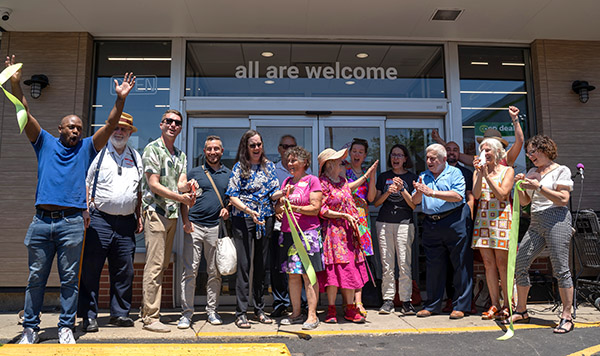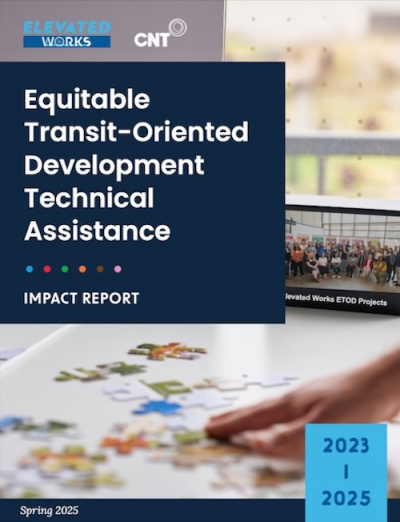Many of Chicago’s most desirable neighborhoods are anchored by CTA stations, which has pushed rents sky high. But we need to stop and think – should access to the CTA only be available to those who can afford high rents? Doesn’t it hurt our entire city when resource-strapped households are hit with the double whammy of unaffordable rents and costly auto ownership?
We support the proposed Keeping the Promise ordinance, designed to reform the Chicago Housing Authority, because we believe that it can help the city better utilize existing tools to give families of all incomes affordable housing options near the transit system. With this ordinance, we can begin to undo the deep inequality that, for decades, has plagued our city.
It’s critical to grow equitable access to that system so we can break the cycle of poverty by connecting people to jobs and lowering the cost of living. But while many recent transit-oriented development projects have included luxury units, developing near transit generates its biggest community benefits when it includes housing for all incomes.
 However, the CHA Plan for Transformation has set our city – and our region – behind in adding and preserving housing near transit for low-income families. Compared to peer regions like New York, San Francisco, and Philadelphia with large, legacy transit systems, between 2000 and 2010, only ours grew faster away from transit stations than around them. This happened for many reasons, including sprawl, disinvestment, and downzoning to permit lower density in gentrifying neighborhoods.
However, the CHA Plan for Transformation has set our city – and our region – behind in adding and preserving housing near transit for low-income families. Compared to peer regions like New York, San Francisco, and Philadelphia with large, legacy transit systems, between 2000 and 2010, only ours grew faster away from transit stations than around them. This happened for many reasons, including sprawl, disinvestment, and downzoning to permit lower density in gentrifying neighborhoods.
No single policy decision matched the lasting impact of the CHA Plan for Transformation, which alone led to the loss of almost 6,000 occupied units near transit. While these buildings were neither safe nor decent, many of them were within walking distance of CTA stations, and the units they housed have not been replaced. Because of that, our rate of regional growth was a third lower than it otherwise would have been.
 It’s time to turn that trend on its head and replace these units around transit. With project-based vouchers, we can add new units for low-income families for TOD projects, without extra cost to the developer. We can begin to reverse the impact of the CHA Plan for Transformation and we can do it in a way that desegregates the city and helps it grow. We support the Keeping the Promise Ordinance because it can better equip the Chicago City Council to do just that.
It’s time to turn that trend on its head and replace these units around transit. With project-based vouchers, we can add new units for low-income families for TOD projects, without extra cost to the developer. We can begin to reverse the impact of the CHA Plan for Transformation and we can do it in a way that desegregates the city and helps it grow. We support the Keeping the Promise Ordinance because it can better equip the Chicago City Council to do just that.
With the Keeping the Promise Ordinance, we can ask CHA to release more vouchers and directly build them into new transit-oriented projects. With a Replacement Housing Plan, we can revisit the topic of the units lost during the Plan for Transformation and integrate replacement units with new investment around transit. And improved transparency between CHA and the City Council could lead to better utilization of our city’s most untapped asset for affordability: the strong credit rating and operating reserves of the CHA. Together, we could leverage that strong credit for a bold new initiative creating new housing for low-income families in booming transit-served neighborhoods.
Chicago needs tools to ensure equitable growth around our transit system that prioritizes units for people of all incomes, for families, and for residents of every neighborhood. Chicago’s TOD Ordinance will unlock new market-rate investment, but we can’t measure the health of our city by only looking at those at the top of the income spectrum – we must also do everything we can to lift up those struggling at the bottom. Building affordable housing near all of our transit lines not only gives access to opportunity, but it also will help crack the rigid barriers of segregation that have for too long concentrated resources in the hands of the few. We encourage the Chicago City Council to adopt the Keeping the Promise Ordinance to give Chicago the tools needed to support transit-oriented development for low-income families.





 Strengthening Transit Through Community Partnerships
Strengthening Transit Through Community Partnerships